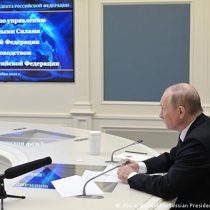
Russian President Vladimir Putin on Wednesday oversaw the nuclear attack exercises, involving nuclear submarines, strategic bombers and ballistic missiles. This, at a time of great tension over the accusation of “dirty bomb” that has been launched against Ukraine.
Putin remotely watched the annual exercise, dubbed “Grom” or “Thunder,” which uses launches to test Moscow’s nuclear forces in a show of force designed to deter and intimidate enemies.
One ballistic missile was launched over the Kamchatka Peninsula in the Russian Far East, and another from the waters of the Barents Sea in the Arctic. The exercise involved Tu-95 long-range bomber aircraft.
“The tasks set during the strategic deterrence training exercise were fully accomplished, as all missiles hit their target,” the Kremlin said in a statement.
The Pentagon said a day earlier that Russia had notified it of its intention to conduct the exercises at a time when NATO is testing its own use of U.S. nuclear bombs based in Europe in its annual “Steadfast Noon” war games.
The flexing of the nuclear muscle is delicate because Russia is on the defensive in Ukraine and has accused this country of planning to detonate a “dirty bomb” with radioactive material.
Kiev and the West say there is no evidence for the accusation and that the warning appears designed to increase tension over the war in Ukraine or to serve as justification for some kind of Russian escalation on the battlefield.
Western officials have expressed fears that Moscow may be tempted to use a low-yield “tactical” nuclear weapon in Ukraine to try to force Kiev to capitulate at a time when Ukrainian forces are advancing into Russian-occupied Kherson province, threatening a major defeat for Moscow.
U.S. President Joe Biden warned Moscow on Tuesday that such a move would be an “incredibly serious mistake.”
Putin, who will chair a Security Council meeting later on Wednesday, has warned that Russia has the right to defend its own territory using any weapon from its arsenal, but has not specifically spoken of tactical nuclear weapons.
Russia informs China and India
Russian officials said Moscow’s protective nuclear umbrella was expanded to cover four Ukrainian regions that Putin says he has annexed, a move not recognized by Kiev or the West, while underscoring a desire to avoid a nuclear conflict.
A day after Russia presented its “dirty bomb” accusations at the UN Security Council, Russian Defense Minister Sergei Shoigu briefed his Chinese counterpart, Wei Fenghe, by video, conveying Moscow’s concern about what he called Kiev’s “possible provocations” regarding a “dirty bomb.” his wallet said.
Shoigu, a close Putin ally, held a similar video conference with his Indian counterpart. Rajnath Singh, India’s defense minister, told Shoigu that neither side should use nuclear weapons in the Ukraine war, according to an Indian government statement.
“The possibility of using nuclear or radiological weapons goes against the basic principles of humanity,” Singh told Shoigu. Singh called for an early resolution of the conflict through dialogue and diplomacy, a prospect that, for now, seems remote after eight months of war and amid a successful Ukrainian counteroffensive that has forced Russian troops to withdraw.
Ukrainian counteroffensive slows down
Meanwhile, the battlefield situation in Ukraine has stabilized and the Russian evacuation from the annexed Kherson region in the face of the Ukrainian advance continues.
According to Ukrainian Defense Minister Oleksii Reznikov, quoted by the UNIAN agency, Ukrainian forces have liberated more than 90 localities in the region that Russia joined last month.
At the same time, Reznikov acknowledged that the Ukrainian counterattack in the south has slowed due to abundant rainfall in the area.
“Right now, because of the weather conditions, and by that I mean the rains, the counteroffensive has slowed down a bit. But we employ the tactic of liberating our localities step by step and kilometer by kilometer. And we will continue to do so,” he said.
The governmentVladimir Saldo, acting manager of the Kherson region, reported that since October 19 some 70,000 people have been evacuated to the left bank of the Dnieper River.
However, he insisted that the Russians will not leave the regional capital. “No one is going to deliver Kherson. The military knows what they are doing,” he said, adding that the departure of civilians is necessary to prevent them from being caught in the middle of fighting in the area.
Follow us on
"El reclamo puede ser genuino, pero construido sobre una mentira", apuntó el presidente Javier Milei…
El gobernador de la provincia de Buenos Aires, Axel Kicillof, encabezó un acto en Ensenada…
El diputado nacional de La Libertad Avanza, José Luis Espert, expresó su confianza en la…
Tras la masiva reaparición de Cristina Fernández de Kirchner, el presidente Javier Milei apuntó contra…
El principal propósito de la nueva comisión es evaluar los recursos humanos en el Senado,…
En una medida que busca redefinir las condiciones de los seguros de automóviles en Argentina,…
Esta web usa cookies.